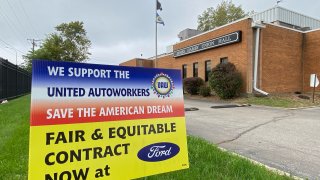
The United Auto Workers union says its two-week strike against Detroit automakers will spread to 7,000 more workers at a Ford plant in Chicago and a General Motors assembly factory near Lansing, Michigan.
Union President Shawn Fain told workers on a video appearance Friday that negotiations haven’t broken down but Ford and GM have refused to make meaningful progress. Jeep maker Stellantis was spared from the third round of strikes.
The GM plant in Delta Township, near Lansing, makes large crossover SUVs such as the Chevrolet Traverse. A nearby metal parts stamping plant will remain open, Fain said.
The Chicago Ford plant makes the Ford Explorer and Explorer police interceptors, as well as the Lincoln Aviator SUV. The Explorer interceptor is the nation’s top selling police vehicle.
“Sadly, despite our willingness to bargain, Ford and GM have refused to make meaningful progress at the table,” Fain said in explaining the two new strike locations.
The union has vowed to hit automakers harder if it does not receive what it calls substantially improved contract offers as part of an unprecedented, simultaneous labor campaign against all three Detroit automakers.
Additional walkouts will begin at noon Friday.
Local
Progress was reported in talks Thursday night, especially with Stellantis.
The automakers’ last known wage offers were around 20% over the life of a four-year contract, a little more than half of what the union has demanded. Other contract improvements, such as cost of living increases, restoration of defined benefit pensions for newly hired workers and an end to tiers of wages within the union are also on the table.
Feeling out of the loop? We'll catch you up on the Chicago news you need to know. Sign up for the weekly Chicago Catch-Up newsletter here.
The union went on strike Sept. 15 when it couldn’t reach agreements on new contracts with the companies. Contracts expired at 11:59 p.m. Sept. 14.
The UAW initially targeted one assembly plant from each company. Last week it added 38 parts distribution centers run by GM and Stellantis. Ford was spared the second escalation because talks with the union were progressing at that time.
The union has structured its walkout in a way that has allowed the companies keep making pickup trucks and large SUVs, their top-selling and most profitable vehicles. Previously it shut down assembly plants in Missouri, Ohio and Michigan that make midsize pickup trucks, commercial vans and midsize SUVs, all of which are profitable but don’t make as much money as the larger vehicles.
In the past the union had picked one company as a potential strike target and reached a contract agreement with that company that would serve as a pattern for the others.
But this year Fain introduced a novel strategy of targeting a limited number of facilities at all three automakers, while threatening to add more if the companies do not come up with better offers.
About 25,000 of the union’s 146,000 workers at the three automakers are on strike, allowing it to preserve a strike fund that was worth $825 million before Sept. 14.
If all of the union’s auto workers went on strike, the fund would be depleted in less than three months, and that’s without factoring in health care costs.



